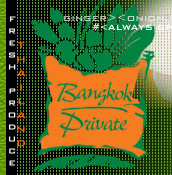

Thailand is blessed with an abundance of naturally growing
herbs,which for thousands of years humans have used not only
to create the exotic flavours of Thai cuisine,but alsso to
treat ailments.
Modern medicine eventually overshadowed the achievements of
the raditinal physicians,but now that is changing. Over the
past two decades government agencies have renewed their interest
in traditional Thai medicine and medicinal plants.
This is perhaps a direct effect of the World Health Organisation
conference in 1997 at which the preservation of the precious
national heritage of traditional medicine was strongly encouraged.Many
outlets are now selling herbal remedies as interest in traditional
ways continuess to increease.
Research into the effectiveness of traditional remedies led
in 1982 to the establishment of the Foundation for the Promotion
of Thai Traditional Mdicine.From then on.with the cooperation
of the Forestry Department,a programme for cultivating,selecting,and
distributing medicinal plants was set intomotion,and a whole
new industry was born. The cultivation of aloe vera,for example,is
now big business in Thailand,Well known for its burnsoothing
properties and commonly mixed into shampoos and skin creams,it
is also used in the treatment of peptic ulcers.The Wan Hang
Joraket platation in Hoob Krapong is particularly noted for
aloe vera production.
Herbs and spices used commonly in cooking invariably have
medicinal properties.Galangal,ginger,and sweet basil(delicious
in curries and soups)are also effective carminatives that
can ease gas problems,Turmeric is used for skin problems and
peptic ulcers.Wax gourd can ease haemorrhoids,and its seeds
are said to be good for the lungs.Winged bean seeds are said
to strengthen the body. Pennywort is for skin diseases.Herbal
teas are also popular,and several kinds are grown.





